|
|
|
Sort Order |
|
|
|
Items / Page
|
|
|
|
|
|
|
| Srl | Item |
| 1 |
ID:
114966
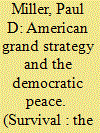

|
|
|
|
|
| Publication |
2012.
|
| Summary/Abstract |
It is commonplace to lament the United States' lack of a coherent grand strategy. Cold War historian John Lewis Gaddis argued in 2009 that the United States suffered from a 'grand strategic deficit' that went back two decades to the fall of the Soviet Union. Stephen Walt, a prominent International Relations professor at Harvard, blogged in 2010 that 'the United States tries to do more than it should, finds it much harder to set clear priorities, and tends to miss opportunities to "pass the buck" to others', the solution for which was 'a more lively public debate on fundamental issues of grand strategy'. Fareed Zakaria, then editor of Newsweek International, wrote in 2008 an article titled simply: 'Wanted: A New US Grand Strategy'.
|
|
|
|
|
|
|
|
|
|
|
|
|
|
|
|
| 2 |
ID:
128232
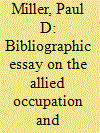

|
|
|
|
|
| Publication |
2013.
|
| Summary/Abstract |
There is no definitive, single-volume history of the Allied occupation and reconstruction of West Germany from 1945 to 1955. This is a significant and surprising lacuna in the literature on US and European history, international relations, and the rapidly growing field in reconstruction and stabilization operations. Scholars, historians, and policymakers need a comprehensive treatment of the German occupation. There is now an opportunity to fill that need. This bibliographic essay reviews the wealth of source material that has become available in recent decades. We can now synthesize primary sources and specialized scholarship to tell the story, for the first time, of how the Allies occupied and rebuilt the western part of Germany.
|
|
|
|
|
|
|
|
|
|
|
|
|
|
|
|
| 3 |
ID:
127308
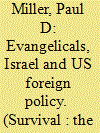

|
|
|
|
|
| Publication |
2014.
|
| Summary/Abstract |
America's Middle East policy has been a haphazard blend of hard-headed realism, idealism and dispensationalist theology. The result has not served US interests well.
|
|
|
|
|
|
|
|
|
|
|
|
|
|
|
|
| 4 |
ID:
123636
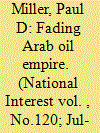

|
|
|
|
|
| Publication |
2012.
|
| Summary/Abstract |
PRESIDENT OBAMA'S pivot to East Asia is well-timed. The geostrategic importance of the Middle East is vastly overblown. The region matters to the United States chiefly because of its influence in the world oil market, but that influence has been in terminal decline for a generation, a fact almost wholly unnoticed by outside observers. A confluence of developments-including rising prices and production costs, declining reserves, and the availability of alternate fuels and unconventional sources of oil-will decisively undermine the defining role of the Middle East in the global energy market. Meanwhile, the United States has vital interests at stake elsewhere in the world at least as pressing, if not more so, than its interests in the Middle East. These include thwarting the proliferation of weapons of mass destruction, fighting transnational terrorism and maintaining stability in key strategic locations of the world.
|
|
|
|
|
|
|
|
|
|
|
|
|
|
|
|
| 5 |
ID:
100570
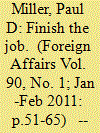

|
|
|
|
|
| Publication |
2011.
|
| Summary/Abstract |
Since 2001, Afghanistan's economy has grown at an impressive rate and major development indicators in the country have improved dramatically. Even security and the rule of law -- long neglected -- are now improving. Washington and its allies could still win in Afghanistan if they are given the time they need.
|
|
|
|
|
|
|
|
|
|
|
|
|
|
|
|
| 6 |
ID:
115188
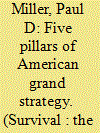

|
|
|
|
|
| Publication |
2012.
|
| Summary/Abstract |
In a previous Survival article, I argued that, contrary to widespread belief, the United States has been pursuing at least one pillar of an implicit grand strategy since the end of the Cold War: building the democratic peace. The democratic peace has informed most major US foreign-policy initiatives over at least the last two decades, and rightly so: it has many strengths to recommend it, including its harmony with values the American electorate broadly shares. But championing liberalism is only one component of US grand strategy. There are four others: defending the American homeland from attack, maintaining a favourable balance of power among the great powers, punishing rogue actors, and investing in good governance and allied capabilities abroad. Like support for democracy, these broad goals are well within the mainstream of US foreign policy; they enjoy bipartisan support, and have been remarkably consistent for decades.
|
|
|
|
|
|
|
|
|
|
|
|
|
|
|
|
| 7 |
ID:
146236
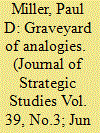

|
|
|
|
|
| Summary/Abstract |
Decades of scholarship have warned against using historical analogies for policymaking. But the Taliban insurgency appears, on the surface, to confirm the usefulness of historical analogies to the British and Soviet wars in Afghanistan. I review the use of analogies for the war in Afghanistan and argue the analogies were historically unsound and strategically unhelpful. In fact, their effect on policy helped create the conditions for the very insurgency policymakers most hoped to avoid. The Taliban insurgency did not occur because of the presence of too many foreign troops and aid workers, but because there were too few.
|
|
|
|
|
|
|
|
|
|
|
|
|
|
|
|
| 8 |
ID:
116613
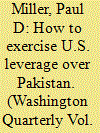

|
|
|
|
|
| Publication |
2012.
|
| Summary/Abstract |
The United States has more leverage over Pakistan than is widely appreciated, and it is time for American policymakers to use it. Since 2001, two successive administrations have tried to persuade Pakistan to end its support for militants-including the Afghan Taliban and the Haqqani network-exclusively through aid, diplomacy, and persuasion with few sanctions or conditions: an approach of all carrots and no sticks. They did so in the belief that Pakistan's fundamental problem was a lack of capacity, not will. They were wrong.
|
|
|
|
|
|
|
|
|
|
|
|
|
|
|
|
| 9 |
ID:
115070
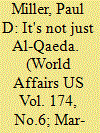

|
|
|
|
|
| Publication |
2012.
|
| Summary/Abstract |
Neither President Barack Obama nor the Republicans competing to run against him are eager to talk about the war in Afghanistan. The electorate certainly doesn't want to hear about it. Defense analysts are acting like it ended when Iraq did. Even more amazing is that most analysts and policymakers seem to believe that, one way or another, it doesn't actually matter very much that it didn't.
|
|
|
|
|
|
|
|
|
|
|
|
|
|
|
|
| 10 |
ID:
161322
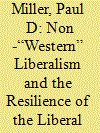

|
|
|
| 11 |
ID:
145950
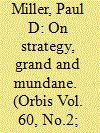

|
|
|
|
|
| Summary/Abstract |
Is “grand strategy” a useful concept? What is it, and how is it different from “strategy”? Some definitions of grand strategy—as an all-encompassing idea for coordinating the resources of an entire nation to achieve its ultimate goals—are unachievable, overly focused on strategy as a master concept, could unintentionally militarize domestic policy, and blur the lines between strategy and policy. The concept is salvageable. Grand strategy is best thought of as both the intellectual framework or master concept that ties together whole-of-government (but not whole-of-nation) planning, and the long-term pattern of behavior that reveals states’ behaviors and priorities in action.
|
|
|
|
|
|
|
|
|
|
|
|
|
|
|
|
| 12 |
ID:
116655
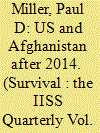

|
|
|
|
|
| Publication |
2013.
|
| Summary/Abstract |
The United States is not scheduled to withdraw from Afghanistan in 2014. President Barack Obama made clear in his May 2012 speech in Kabul that the United States would continue to train Afghan security forces and undertake counter-terrorism operations, which are likely to require thousands of US troops to operate in the country for years to come. The year 2014 is a date for transition, not withdrawal, and the international community has pledged to hand over leadership for security to the Afghan government - no more, no less. Afghan leadership will come with a heavy helping hand from the continued presence of international partners.
|
|
|
|
|
|
|
|
|
|
|
|
|
|
|
|
|
|
|
|
|